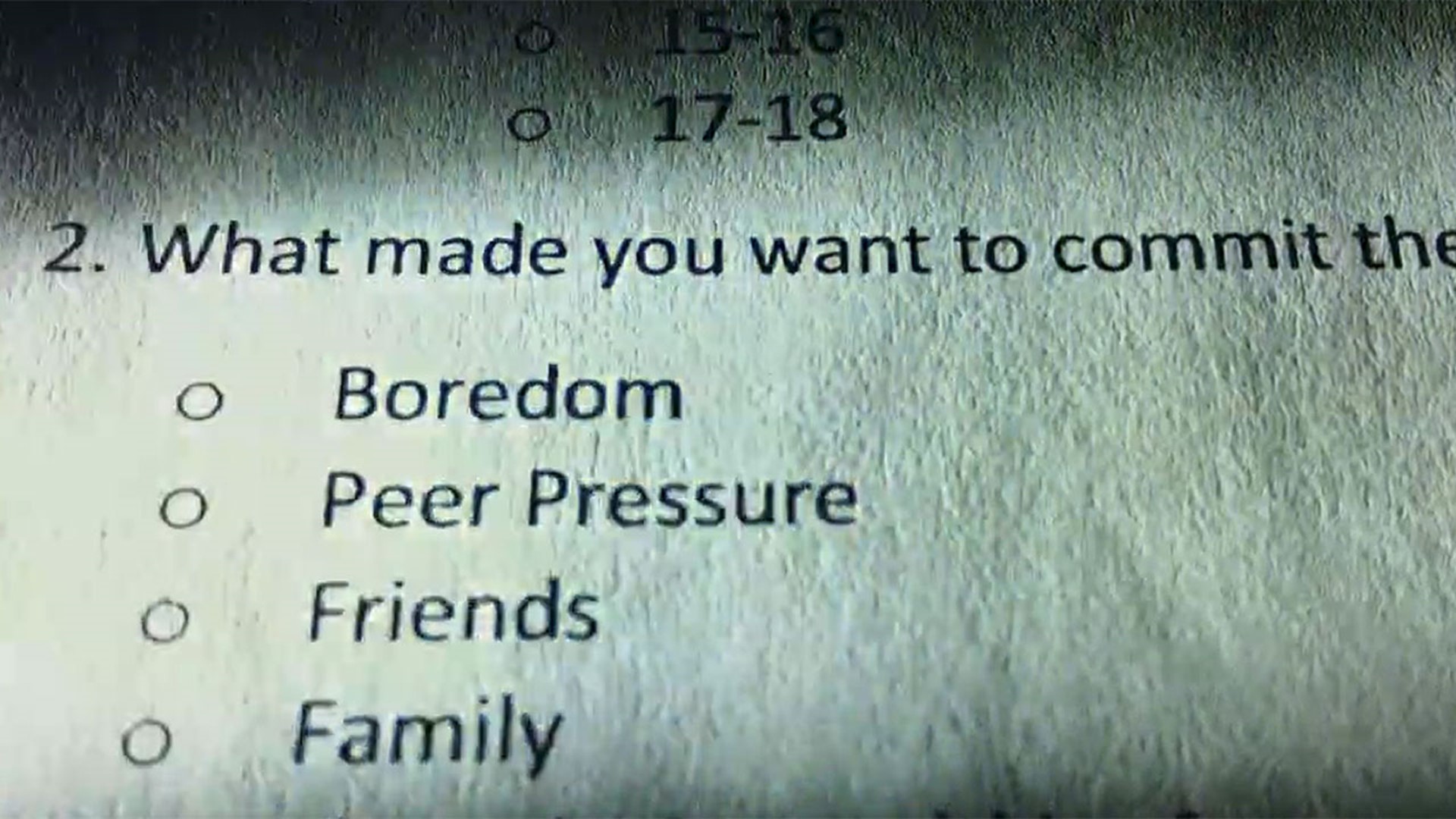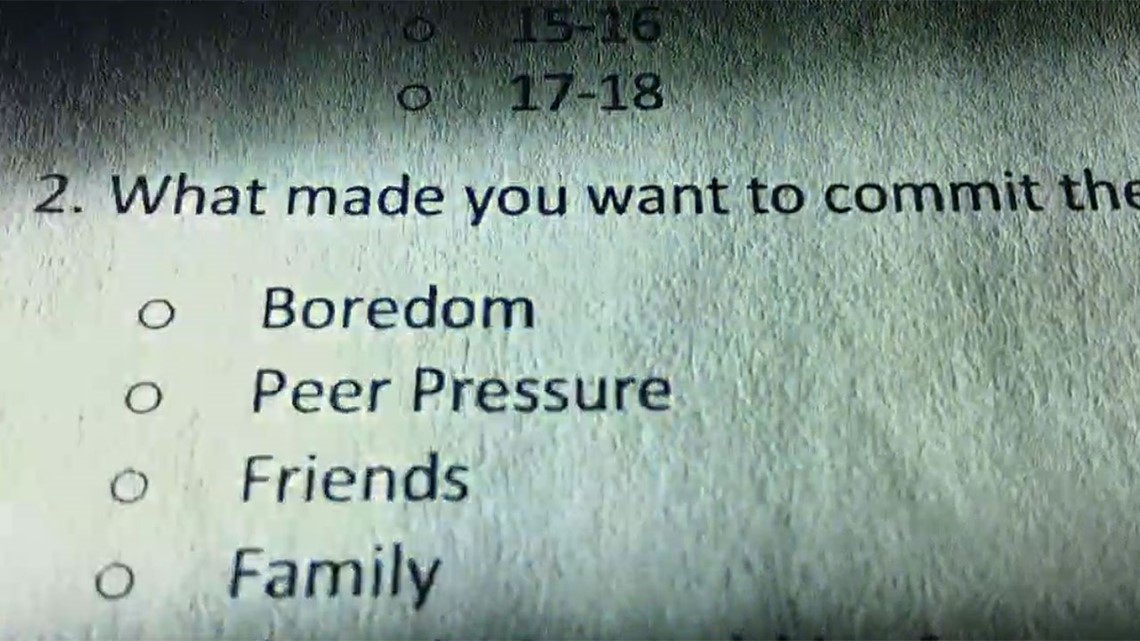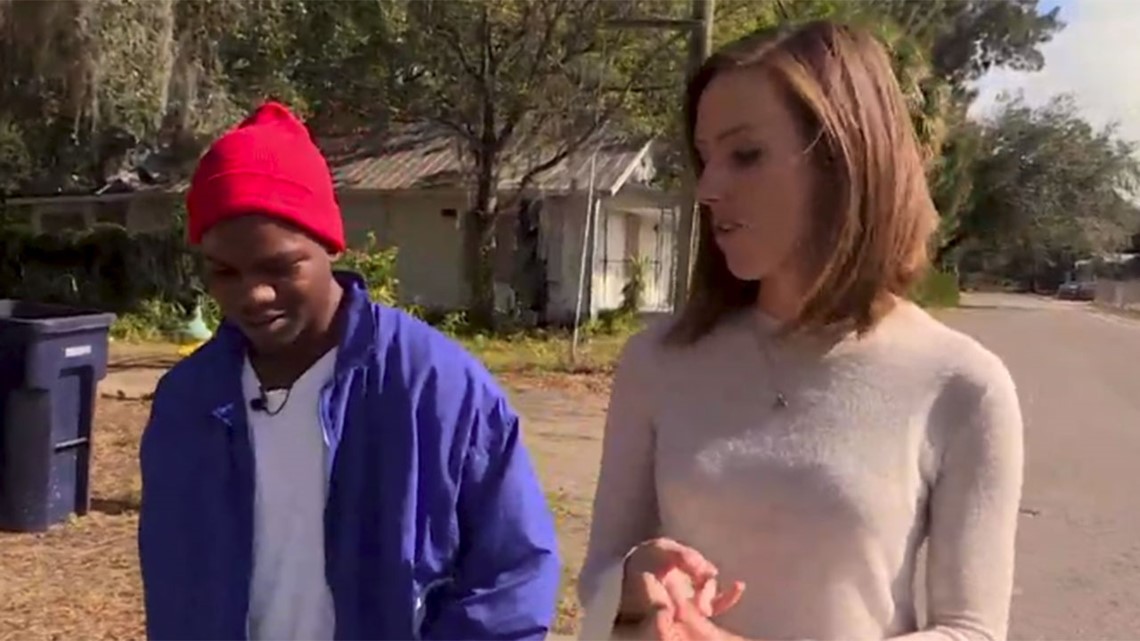We asked 123 young people in prison...WHY?
Was there something that could have stopped them? Many of them said yes.

It was the early morning hours of March 31, 2016, when police say three teenage girls were killed after a stolen car they were in drove into a pond in Pinellas County.
Throughout the day, Pinellas County Sheriff Bob Gualtieri would speak about the tragic incident but also mention that the three girls who passed away all had criminal histories.
He mentioned then that juvenile crime, especially felonies that included auto theft, was on the rise.
Since that day, every day young people continue to commit crimes.
On August 10, 2017, a 17-year-old with multiple prior felonies was arrested again for burglary in Winter Haven. The teen’s criminal history dated back to when he was 10 years old.
On November 30, four teens were arrested in St. Pete after they stole an SUV and hit another car, sending the driver of that vehicle to the hospital.
And earlier this month, several juveniles were arrested overnight in a stolen car. The driver of that vehicle was just 15 years old.
“There’s no respect. They don’t care. There’s no fear of consequence”
In a press conference nearly two years ago, Sheriff Bob Gualtieri addressed the juvenile crime problem saying, “There’s no respect. They don’t care. There’s no fear of consequence.”
After officials addressed the startling statistics of juvenile crime in Pinellas County they created a task force to monitor repeat juvenile offenders in Pinellas County. They target teens who have a minimum of 5 felonies.
We drove around one night with the task force as they made their way through probation checks. On the second house we stopped at, the teen was not home. There will now be a warrant out for his arrest.
“We probably check about 100 juveniles a night,” says Steven Costa, St. Pete Police Officer and member of the H.O.M.E. Task Force.
He believes that the reason why the juveniles keep on committing these crimes over and over again is because the juvenile justice system is broken.
We wanted to know: Why?
Statewide in the past five years, there have been 373,535 youth arrests. Of those,18,904 are under 12 years old.
While every day young people are committing crimes, and officials are standing behind a podium telling us about it, 10Investigates wanted to reach out to the ones causing the crimes, asking them WHY?
Over the past year, we mailed out more than 100 questionnaires to young people in prison, ranging from 18-20 years old. All of the men and women we reached out to had lengthy criminal histories as juveniles.
We asked them questions like, ‘How old were they when they committed their first crime?’ to “What could your parents, teachers, law enforcement have done?’
Every time we mailed out a handful, within days, responses started to come back.
The Results
It was a survey of just 11 questions.
- How old were you when you committed your first crime?
30% said they were under 10. 50% said they were 10-12 years old. 20% were 13-16 years old.
- What made you want to commit the crime?
44% said that their friends made them want to do it. 32% said it was because they were bored. 24% said other. 1 commented they were curious.
- What could have stopped you from making bad decisions?
56% said more things to do. 43% said attentive parents. 38% said different group of friends.
- What could your parents have done?
72% said paid more attention. 26% said asked more questions.


- If you committed a crime, were you scared about the trouble you would get in if you were caught?
100% said No.
One person commented that they never thought about getting caught or the consequences. Another person commented, "I was impulsive. I always did what came to mind and I only worried about consequences once I got caught."
- When would you get in the most trouble?
54% said during school hours, while 42% said after school hours. And 38% said nighttime. A lot of people commented on all three times.
- Would you sneak out of the house?
91% said yes.
When we asked how, many said out their bedroom window once their parents fell asleep.
- Were your parents strict?
44% said yes.
- Were you involved in any activities?
47% said no. A few said they were involved in sports. And others did admit they were involved in church.
- If the consequences were harsher from the beginning, do you think that would have made a difference?
Everyone said yes.
- What is the one thing a parent/guardian/teacher could have done that may have prevented you from ending up in jail?
One person wrote, ‘Took time to show that they cared and been a positive influence in my life." Another questionnaire said, "They can all show more kids lots of love."
Here are several of the surveys we received. Click or tap on the links to enlarge the surveys.
Letters from juvenile offenders by 10News WTSP on Scribd
Letters from juvenile offenders by 10News WTSP on Scribd
Letters from juvenile offenders by 10News WTSP on Scribd
Survey from juvenile offenders by 10News WTSP on Scribd
Survey from juvenile offender by 10News WTSP on Scribd
Survey from juvenile offender by 10News WTSP on Scribd
Survey from juvenile offender by 10News WTSP on Scribd
Survey from juvenile offender by 10News WTSP on Scribd
Survey from juvenile offender by 10News WTSP on Scribd
Letter from juvenile offender by 10News WTSP on Scribd
Survey from juvenile offender by 10News WTSP on Scribd
Survey from juvenile offender by 10News WTSP on Scribd
Survey from juvenile offender by 10News WTSP on Scribd
Survey from juvenile offender by 10News WTSP on Scribd
Meet Demarcus


Once the surveys started to trickle back in, we found a 19-year-old who had been in trouble with the law in the past. We wanted to get a better insight on some of the answers.
“I was in 6th grade when I committed my first crime. I was 15 years old when I got in trouble for a home invasion,” says Demarcus. “That’s big. But it’s for the mass. It’s for thousands of dollars. It’s for the money."
When Demarcus was in elementary school, he says he knew kids breaking the law then. He says at 10 years old he would sell weed other types of drugs. Some of his other friends would steal bikes and break into cars. He says that’s how he got caught up in trouble.
“I mean if I had something, like say football or something, to keep my mind off of it, then maybe things would have been different,” says Demarcus.
Demarcus was arrested five different times by the time he was 17.
“When you’re doing the crime, you don’t want to think about jail. And if you get in trouble, you just accept it and you go to jail. I was never scared of the consequences.”
“Biggest Issue: No Consequences”
“It’s not surprising. We’ve seen this trend over the past five years. Kids under 10 are committing a lot of these crimes,” says St. Pete Police Chief Anthony Hollloway. “The biggest issue we’re talking about is there are no consequences. I’m not saying lock a 10-year-old up, but it’s the parent involvement and the community involvement. What are we going to do once this child is breaking the law?”
Holloway says he’s not surprised that of the responses we got back, most of them committed crimes because they were bored.
When asked if there are free programs for grade school kids, he says yes but does admit, “We could do a better job, in the schools, promoting them.”
Holloway says he would also like more school resource officers in the elementary schools: not to make arrests, but to be there as a friend and mentor for young people.
“It’s going to take the whole community to make changes,” says Holloway. “Let’s not come up with excuses and let’s figure out what the problem is before they get to the age of 18 and they are spending 4-5 years in prison. Why are we not addressing this problem when the child is 10 and 12 because that’s the time to start addressing it.”
Someone gave him a chance
Demarcus says the last time he was arrested he was 17 years old.
“It was like an opportunity. Why not take it,” says Demarcus.
A judge gave him a chance. He says that instead of sending him to prison, she told him to get his GED and take weekly drug tests. He did and he has not been arrested since.
“That was the wake-up call. You have to think about it in the long run you understand. If you want to be somebody, you can’t go stealing it. I know what it’s like to work for something so I am not going to go back and touch that.”
Words from a judge
Circuit Court Judge James Pierce has been hearing cases for years, especially juvenile cases.
“The biggest one that has shocked me is when a child said, ‘I didn’t learn anything from this,'” says Pierce.
He says some kids don’t understand the consequences.
“I think we do need to have some teeth, a little bite in juvenile law. But we still must not lose focus of the true purpose of the juvenile justice system,” says Pierce.
He says the number of juvenile cases is going down, and he hopes it’s a trend that continues to stay.
“It’s those moments where you’ve got to recognize there is something good about this child, now what is it.”
Judge Pierce agrees that these kids need positive role models, somebody to look up to.
“Be a mentor to a child. It’s important that these children have someone to go to, talk to, communicate with.”
How to get involved in a mentoring program:
If you are a mentoring group that would like to be added to this list or if you have a story for Jennifer to investigates, email her at jtitus@wtsp.com.
